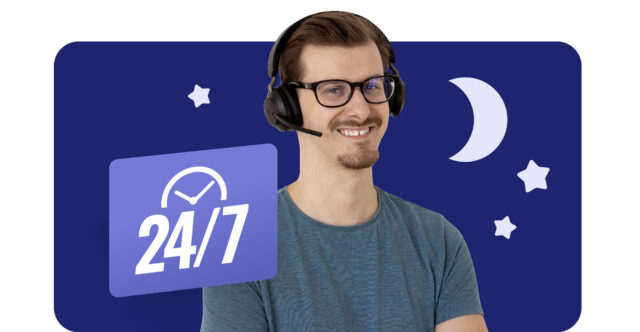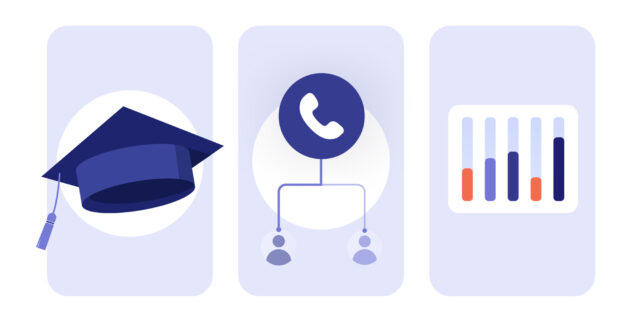After-Hours Call Answering Service
Leverage an after-hours call answering service to deliver responsive customer support around the clock. Learn the benefits of this approach and how to implement it in your call center.
What Is an After-Hours Call Answering Service?
An after-hours call answering service is a strategy that allows businesses to stay reachable by phone outside of regular customer service hours. This approach ensures that customers receive timely assistance any time they need it—be it evenings, weekends, or holidays.
This service is especially valuable in industries like IT, where technical issues need immediate resolution, or in sectors such as banking and insurance, where customers expect round-the-clock support. It’s also highly effective in e-commerce, where assisting customers outside standard hours can make or break a sale.

Benefits of an After-Hours Call Answering Service
Deliver Responsive Customer Support
An after-hours call answering service ensures seamless service continuity, providing support to customers whenever they need it. If a customer faces an issue outside standard business hours, they can reach out to your business and receive immediate assistance. This level of responsiveness enhances customer satisfaction and helps reduce churn caused by unresolved problems.

Improve Call Center Efficiency
While it benefits customers, an after-hours call answering service also supports call center managers. By extending call coverage to off-peak hours, it spreads call volume more evenly throughout the day. For example, urgent evening calls for technical issues can be handled promptly, reducing the workload on agents during regular business hours.
From a cost perspective, this approach can be more efficient as agents are compensated only for the time spent actively assisting customers during the after-hours shift.

Challenges of Implementing an After-Hours Call Answering Service
Managing After-Hours Teams
Setting up an after-hours call answering service team can be challenging for call center managers. It requires identifying agents who are available to handle calls outside standard business hours.
Additionally, this service must comply with labor laws, which may regulate how after-hours shifts are managed and compensated.
Routing After-Hours Calls
To ensure success, after-hours calls must be routed to the right agents during designated shifts. Establish clear schedules and assign agents to handle after-hours coverage. Pre-configuring call routing ensures that customers are always connected to the appropriate team member without delays.
Using an automatic call distributor (ACD) streamlines this process, minimizing technical issues that could negatively impact the customer experience.
Applications of an After-Hours Call Answering Service
How to Implement an After-Hours Call Answering Service ?
To set up an effective after-hours call answering service, follow these steps to ensure a seamless customer experience while optimizing operational costs:
- Identify Use Cases: Before launching the service, define specific situations where after-hours support is essential. Focus on scenarios requiring immediate attention that cannot be addressed through digital channels.
- Define Service Hours: Establish the exact time frames when the after-hours service will be available. For instance, technical support might cover evenings and weekends to meet customer needs effectively.

- Organize and Train Your Team: Select agents willing to handle after-hours calls and ensure they understand the conditions. Provide them with training on how to manage common after-hours scenarios and deliver excellent customer service.
- Configure Call Routing: Use a solution with an integrated Automatic Call Distributor (ACD) to direct calls to the right agents based on the customer’s needs. This ensures quick and efficient resolution of issues.
- Monitor Performance: Once your after-hours call answering service is live, track its performance. Use a quality monitoring dashboard to measure customer satisfaction (CSAT), average response times, and overall communication quality.

FAQ
What’s the difference between an after-hours call answering service and a phone answering service?
While both after-hours call answering services and phone answering services provide support outside regular business hours, there are key differences between the two.
An after-hours call answering service refers to a designated period during which an employee is on-call to handle customer inquiries. The employee is not actively working throughout this time but must be available to take calls. Only the duration of the handled calls is considered as billable working time.
In contrast, a phone answering service involves an employee working continuously during specific hours, regardless of the volume of incoming calls. This setup resembles a traditional customer service role but is designed for specific types of requests during clearly defined timeframes.
What tools are needed to set up an after-hours call answering service?
Implementing an after-hours call answering service requires a robust call center solution. This ensures customer calls are seamlessly routed to the appropriate agent without the customer noticing any difference. Agents can receive calls on their preferred devices, whether it’s a mobile phone, desktop, or other terminals.
A platform like Diabolocom enhances efficiency by enabling automated call routing and providing performance monitoring tools to maintain high-quality service.
How do I determine the best hours for after-hours call answering?
To identify the ideal hours for an after-hours call answering service, analyze your call center’s activity patterns. Determine which types of inquiries require immediate attention and identify the times these inquiries are most frequent.
Review customer interactions on digital channels (such as email or live chat) and automated systems like voicebots. Additionally, consider your customers’ locations and time zones. If your customers are in different time zones from your call center, offering after-hours coverage may be necessary.
How can I train my team to handle after-hours calls effectively?
Before launching your after-hours call answering service, ensure your agents are prepared to manage calls efficiently. If these agents already work in your call center, they likely have a good understanding of the tools and standard responses for customer inquiries.
However, it’s essential to train them specifically for after-hours operations. This includes understanding labor regulations for on-call shifts and managing unique requests. For example, they should be equipped to handle dissatisfied customers professionally and minimize the average handle time (AHT) for each call.